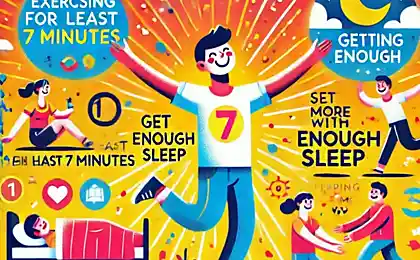215
Happiness is a Habit: 8 Ways to Be Happier, Proven by Science and Life

Introduction. Many of us are used to seeing happiness as the result of external circumstances: great luck, earnings, luck in relationships. But modern psychology and neuroscience are increasingly pointing out that happiness is in many ways a skill we can develop. Just as we train muscles, learn foreign languages, or learn professional skills, we can “train” our ability to be happy. In this article, we’ll look at eight science-based and life-proven ways to build a habit of happiness, strengthen emotional resilience, and boost overall well-being.
Why exactly "skill"? Research in positive psychology (APA) shows that regular practice of certain rituals and techniques can change the structure of the brain (neuroplasticity), forming a more “positive” response to external stimuli. While external factors – finances, health, environment – certainly play a role, our “internal adjustment” and daily habits are often crucial. Let's dive into specifics.
1. Gratitude training
The first step to developing the happiness skill is to practice gratitude regularly. In a hectic rhythm, we easily overlook the positives of the day, concentrating on problems and adversity. But taking 5 minutes every night or morning to remember what we can be grateful for — from small joys (delicious coffee, warm sunshine) to major achievements (recognition at work, the success of friends) — is already beginning to “flash” our brains.
- Scientific justification: According to the NCBI, people who keep a gratitude journal are less likely to become depressed and feel more satisfied with life.
- How to implement this: Write down 2-3 moments each night that make you feel grateful.
2. Mindfulness Meditation (Mindfulness)
Meditation is not only a legacy of Eastern spiritual practices, but also one of the most recognized tools in Western science for improving the quality of life. Mindfulness teaches us to observe our thoughts and feelings without judgment or panic, which reduces anxiety and aggression.
- Why it works: Regular practice of mindful breathing or body scanning reduces the activity of the amygdala, the emotion center responsible for the fight-or-flight response.
- Exercise "3 minutes of awareness": Focus for 60 seconds on breathing, 60 seconds on physical sensations in your body, and 60 seconds on emotions and thoughts that come and go.

3. Physical activity as “emotional doping”
Scientists have long found a link between regular exercise and increased levels of endorphins, the “happiness hormones.” And it is not just about professional sports. It is enough 20-30 minutes of brisk walking, morning exercises or a bicycle walk.
- Effect on the brain: Exercise stabilizes dopamine and serotonin levels, improving mood and creativity.
- Council: Do not look for radical changes: start small – a few minutes of warm-up a day, and gradually increase the duration.
4. The “helping others” effect
Numerous studies show that people who participate in volunteer projects or provide support to others show increased levels of subjective well-being. This phenomenon can be explained not only by the “altruistic” nature of a person, but also by the fact that by helping others, we strengthen our own status and realize our worth.
- Practice: Find small forms of help, from participating in local charity events to mentoring online.
- Why it works: Our brains respond to feelings of “social belonging” and “contribution” by activating areas associated with pleasure and satisfaction.
5. Ability to forgive and let go of offense
Anger and resentment are some of the biggest anti-drivers of happiness. The accumulated negative emotions literally deprive the brain and body of energy that could be directed to something creative. The habit of forgiving (and this is confirmed by neuroscientists) works as a release from the toxic load.
- Council: Learn to separate a person from his actions, try to understand that behind each offense can be his own injuries and vulnerabilities.
- Result: cortisol levels decrease, sleep improves and, as a result, an overall sense of well-being increases.

6. Presence in the Moment (Mindful Living)
We have already mentioned mindfulness, but it is worth noting that this principle applies not only to meditation, but also to everyday activities: eating, walking, socializing, even doing business at work. A conscious approach to each action, whether it is washing dishes or holding a presentation, helps to feel life more deeply and reduce the “scattering” of the mind.
- How to practice: Trying not to “run” mentally into the future or the past, pay attention to the smells, sounds and sensations that are present in the moment.
- Benefits: This "grounding" improves concentration, makes us more empathic and reduces the risk of burnout among the daily stresses.
7. Day regime and quality sleep
Perhaps one of the most underestimated factors of happiness is sleep. Lack of sleep can nullify all self-development efforts as the restless brain becomes vulnerable to irritability and anxiety.
- Medical advice: At least 7 hours of uninterrupted sleep for an adult. Before going to bed, it is advisable to avoid gadgets, bright lights and abundant food.
- Consider the biorhythms: If you are a “lark”, you should not rape yourself with an “owl” schedule, and vice versa.
8. Setting realistic but ambitious goals
As much as we want to go with the flow, a person who has no goals and goals usually feels a loss of strength and meaning. However, too ambitious plans, not commensurate with current resources, can lead to disappointment. Therefore, the rule of the “reasonable mean” in goal setting is so important.
- The SMART method: Goals should be specific, measurable, achievable, relevant and time-limited.
- Role of reinforcement: When you reach a stage or micro-result, note this: buy yourself something nice, praise yourself, or share your success with loved ones.
Conclusion
Contrary to popular misconception, happiness is not something “vague” and inaccessible to the common man. Yes, it is influenced by social and economic conditions, but at the same time it is largely shaped by our everyday habits and attitudes. If we think of happiness as a skill, it is logical that it can be developed through the regular practice of mindfulness, gratitude, physical activity, forgiveness and certain rituals aimed at growing and improving the quality of life.
Each of the eight ways is not a magic wand, but a building block in your emotional well-being. And most importantly, they do not require global restructuring or huge costs. The main thing is to start small and do these things systematically. Over time, the brain will respond to a new “program” of life, and you will see the result not only in your well-being, but also in relationships, professional success and general mood.
So if you want to become happier, take note that happiness is a competence developed by constant and modest actions: learn to thank for the little things, take a few minutes a day of meditation, set achievable goals, exercise, help others and, of course, take care of your sleep. This approach is the way to a stable, accident-free feeling of happiness and satisfaction with life.
Habits for a successful life: 9 useful rituals of each day
Hidden depression: 11 habits of people who suffer internally























